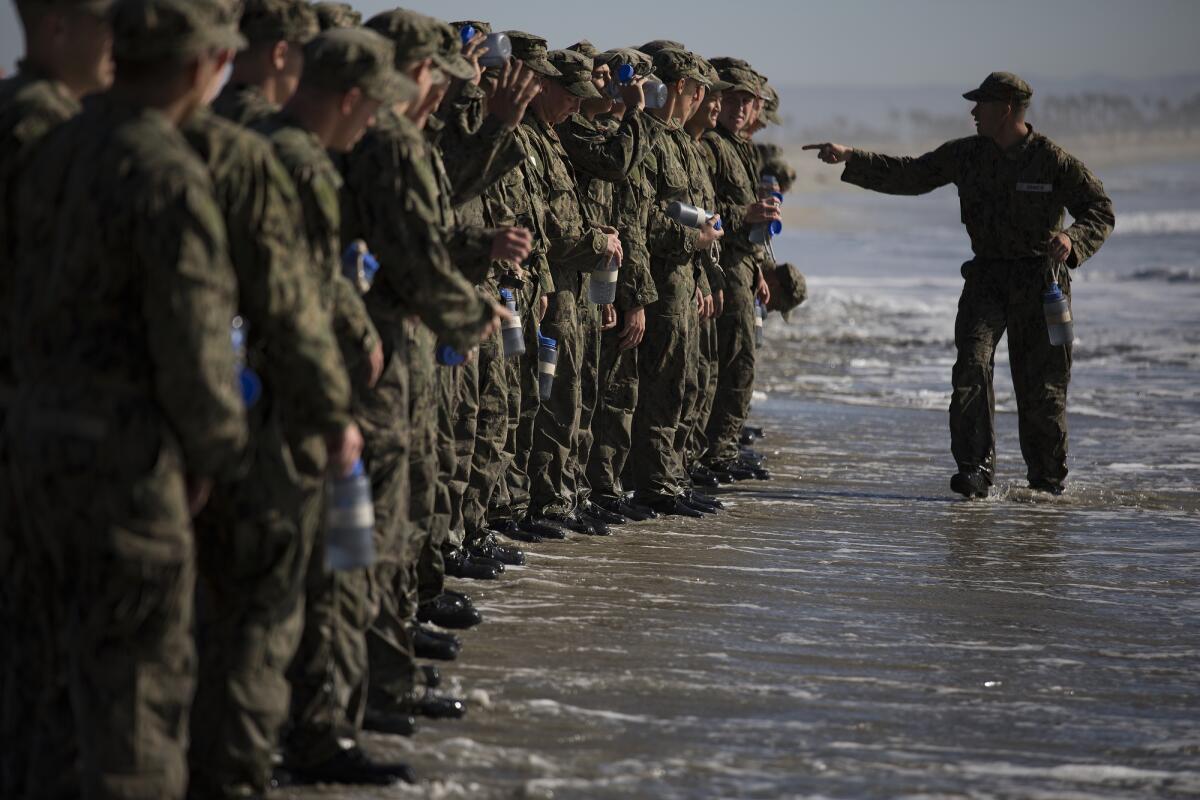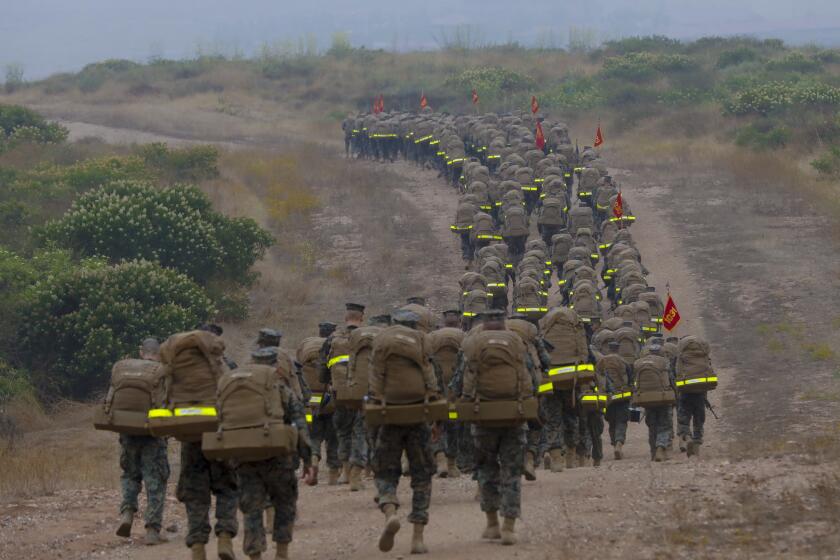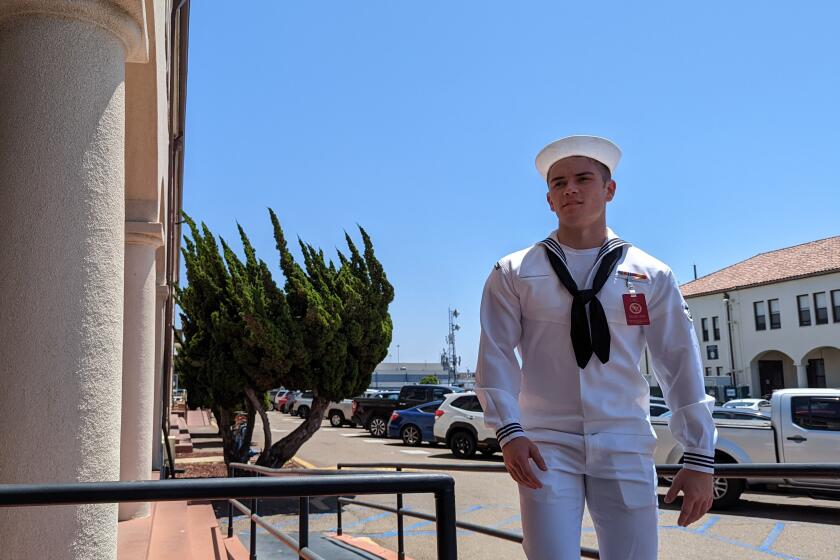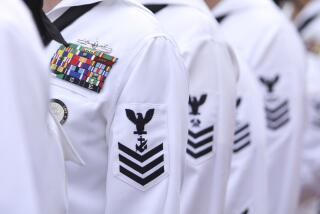Navy SEAL leaders reprimanded over death of trainee during ‘Hell Week’ in February

- Share via
CORONADO, Calif. — Two senior Navy SEAL leaders and a senior medical officer received reprimands in connection with the February death of a SEAL trainee at the service’s school in Coronado, officials said this week.
Seaman Kyle Mullen, 24, died Feb. 4 after completing “Hell Week,” a strenuous 5½-day training session that ends the first phase of the notoriously rigorous Basic Underwater Demolition/SEAL training course. The Navy describes BUD/S as among “the most mentally and physically demanding training in the world.”
The line-of-duty investigation into Mullen’s death, released by the service Wednesday, raises questions about how the Navy supervises trainees, who might be discouraged from reporting medical problems to instructors for fear of being dropped or rolled back in training.
More than half of Navy SEAL trainees don’t complete the first phase of training.
Mullen was suffering from pneumonia and had a swimming-induced pulmonary edema, a condition in which water accumulates in the lungs during surface or underwater swimming, an autopsy found. SEAL trainees are susceptible to the condition due to the nature of their training — they are sent in and out of the cold waters of the Pacific on the Silver Strand in Coronado, where the Naval Special Warfare Center is located.
The sailor’s heart was also enlarged, according to the autopsy. Mullen died of cardiac arrest caused by acute pneumonia. His enlarged heart was a contributing factor, the autopsy said.
Pfc. Javier Pong, 18, collapsed during training at Camp Pendleton and later died on Sept. 27, the Marines said. His death is under investigation.
The Navy medical examiner did not test for drugs. However, Navy medical experts who reviewed the findings noted in the report that performance-enhancing drugs — steroids and human growth hormone — were found in his belongings. Had he taken them, they could have contributed to his heart condition.
After discovering the drugs, Naval Special Warfare launched an investigation and found about 40 other SEAL trainees had used performance-enhancing drugs, the New York Times reported in August.
Mullen had already been diagnosed with the pulmonary edema three weeks before Hell Week, according to the report.
But several of Mullen’s classmates told investigators that he struggled to breathe and was spitting up blood during Hell Week in the days before his death. Although he was coughing up blood and pink foam, Mullen’s classmates said the sailor didn’t want to seek medical care because he didn’t want to roll back in training. Mullen had already been held back once due to heatstroke, the report said.
Mullen’s legs also began to swell during the week, something the Navy told trainees was normal during Hell Week. Mullen gained 22 pounds during Hell Week, the report said.
Navy medical personnel gave Mullen supplemental oxygen on Feb. 3 and the morning of the day he died, the report said.
Mullen finished Hell Week the morning of Feb. 4 and was taken to his barracks room in a wheelchair to recover. A medical officer on duty recommended calling 911, but it did not happen. When Mullen became unresponsive in his room about 90 minutes later, paramedics were called. A Gatorade bottle full of the pink fluid he’d been coughing up for hours was found next to him, the investigation said.
He died at Sharp Coronado Hospital.
The report concludes that Mullen died in the line of duty and not due to his own misconduct.
A 21-year-old sailor was acquitted at a military court-martial on charges accusing him of setting the devastating 2020 fire on the amphibious assault ship Bonhomme Richard.
The incident has already sparked changes in how the health of sailors is monitored during Hell Week, the Associated Press reported, and led to expanded testing for performance-enhancing drugs.
Capt. Brian Drechsler, the commanding officer of the Naval Special Warfare Center, received a reprimand letter as a result of the investigation, according to a Naval Special Warfare spokesperson. Capt. Brad Geary, the former commander of Naval Special Warfare’s Basic Training center, and a senior medical officer also received letters. Geary has since moved on to another job in a routine rotation. None of the officers were removed from their jobs, and the reprimands were non-punitive, the spokesperson said.
A separate command investigation into Mullen’s death is ongoing, the spokesperson said, and the administrative actions against the officers will be reviewed.
A review of Hell Week in consultation with 87 SEALs was included in the report. The vast majority of those surveyed said they’d encountered conditions as challenging as Hell Week during real-world SEAL operations.
More to Read
Sign up for Essential California
The most important California stories and recommendations in your inbox every morning.
You may occasionally receive promotional content from the Los Angeles Times.













